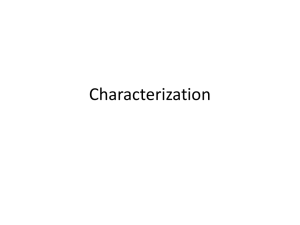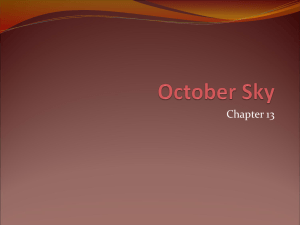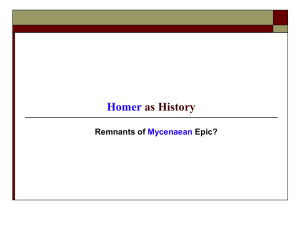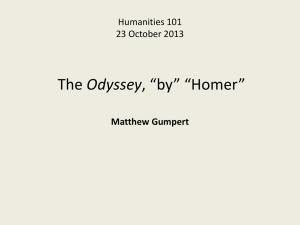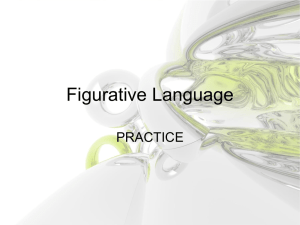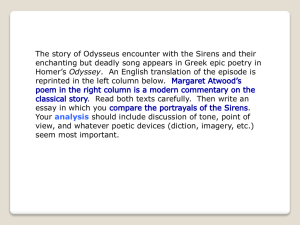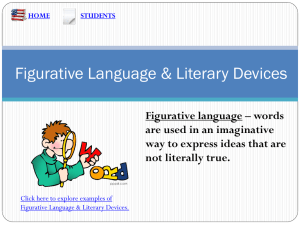Homers Figures of Speech
advertisement
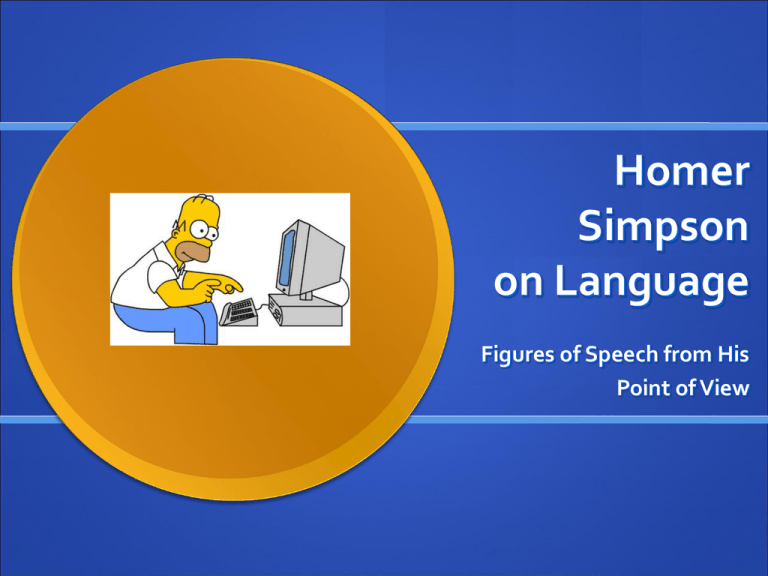
Homer Simpson on Language Figures of Speech from His Point of View Rhetorical Questions Mother Simpson: [singing] ’How many roads must a man walk down before you can call him a man?’ Homer: ’Seven.’ Lisa: ‘No, dad, it's a rhetorical question.’ Homer:’ OK, eight.’ Lisa: ‘Dad, do you even know what "rhetorical" means?’ Homer: ‘Do I know what "rhetorical" means?’ Rhetorical Question: n. a question asked solely to produce an effect or to make an assertion and not to elicit a reply Homeric Rhetorical Question Books are useless! I only ever read one book, To Kill A Mockingbird, and it gave me absolutely no insight on how to kill mockingbirds! Sure it taught me not to judge a man by the color of his skin . . . but what good does that do me? (Homer) Verbal Irony “’Owww, look at me, Marge, I'm making people happy! I'm the magical man, from Happy Land, who lives in a gumdrop house on Lolly Pop Lane! . . . By the way I was being sarcastic’” (Homer). Verbal Irony: a literary technique in which the writer or speaker says one thing but really means the opposite. More often than not, it is accompanied by sarcasm. Personification “’The only monster here is the gambling monster that has enslaved your mother! I call him Gambler, and it's time to snatch your mother from his neon claws!’” (Homer). Personification: a nonhuman thing or quality is talked about as if it were human (e.g., the hands of a clock or an angry sky). (Nordquist, Homer Simpson’s) Oxymoron “Though sometimes misjudged as a complete moron, Homer is actually a deft manipulator of the oxymoron” (Nordquist). “’Oh Bart, don't worry, people die all the time. In fact, you could wake up dead tomorrow’" (Homer). Oxymoron: a figure of speech that combines apparently contradictory or opposing ideas, typically an adjective and a noun, in order to create meaning and draw attention to a particular idea (e.g., living death, deafening silence, or cruel love). (Nordquist, Homer Simpson’s) Paradox vs. Oxymoron Paradox: a figure of speech in which the statement appears to contradict itself but is, nevertheless, true. All forms of irony involve paradox. WHAT THEN SEPARATES THE TWO? Subtle but Significant: Oxymoron vs. Paradox Oxymoron A combination of two contradictory terms Comes with only two to three words that contradict themselves Considered to be a description of a phrase that is contradictory Two words (typically and adj.noun or adv. –adj.) stand next to each other The words seem to be contradictory, but provide a dramatic effect Paradox A statement or a group of statements Apparently a contradictory statement that leads to a true situation that defies intuition Considered to be an action that is contradictory A logic statement contradicting itself A statement that contains opposing elements that when read together make some sense PARADOX OXYMORON http://cleansingzeolite.com/wp-content/uploads/Big-Man-Small-Man1.png 1. Paradox is a statement or group of statements. Oxymoron is a combination of two contradictory terms. 2. Paradox consists of a whole sentence or paragraph. Oxymoron, on the other hand, comes with only two words that contradict themselves. 3. Paradox is an action that is contradictory and oxymoron is a description of a phrase. Euphemisms Euphemism: the substitution of a mild, indirect, or vague expression for one thought to be offensive, harsh, or blunt. Bart’s overweight friend Martin Prince seeks help to lose weight in one of the episodes and the boy’s father tries to make light (note my use of pun?) of the situation: Mr. Prince: We’ll see you when you get back from image enhancement camp. Martin Prince: Spare me your euphemisms! It’s fat camp, for Daddy’s chubby little secret! (Nordquist, Language Lessons) Look out grammar, here we come! The Simpsons Stick it to the English Language Some More! Fragments Identify the fragments after enjoying the verbal sparring! Lisa: Almost done. Just lay still. Linguo the Grammar Robot: Lie still. Lisa: I knew that. Just testing. Linguo: Sentence fragment. Lisa: “Sentence fragment” is also a sentence fragment. Linguo: Must conserve battery power. (Nordquist, Language Lessons) Connotations Connotation: the idea and feeling the reader associates with the word, as opposed to its dictionary definition. For example, the word mother in addition to its basic meaning (“a female parent”), has the connotations of love, warmth, and security. Remember D for dictionary definition as a reminder. Lisa: “A rose by any other name smells as sweet.” Bart: “Not if you call them ‘Stench Blossoms.” (Nordquist, Language Lessons) http://www.tutsking.com/wp-content/uploads/bart/BartSimpson.jpg Suffixes: Remember to Use Your Vocabulary Know How! Prefixes, suffixes, and basic Latin and Greek roots will help you enormously on the PASS. Take your time to decode what you think at first sight you don’t know. Watch for confusables! Dr. Nick Rivera: Who would have thought? Inflammable means flammable! Review those common prefixes and suffixes I’ve taught you! Homer: Good things doen’t end in –eum; they end in –mania or – -teria. Based on what you know, do you agree with Homer? (Nordquist, Language Lessons) Types of Sentences: Imperatives and Exclamations Imperatives: Sentences that give a command, typically “you understood.” Sometimes the recipient of the command is named. Homer: “Shut up, Brain, or I’ll stab you with a Q-tip.” Exclamations: Sentences that exclaim something and end with an exclamation point. They express strong emotion. Homer: I can’t believe it! Reading and writing actually paid off! (Nordquist, Language Lesons) Commercial ~ So much yet to come ... Erotesis "Donuts. Is there anything they can't do?" About.com/Animated TV; www.google.com/im;res?q=donuts&hl=en&safe Erotesis: a form of a rhetorical question implying strong affirmation or denial Anaphora A rhetorical term for the repetition of a word or phrase at the beginning of successive clauses. I want to shake off the dust of this one-horse town. I want to explore the world. I want to watch TV in a different time zone. I want to visit strange, exotic malls. I’m sick of eating hoagies! I want a grinder, a sub, a foot-long hero! I want to LIVE, Marge! Won’t you let me live? Won’t you, please? (inhabiting the spirit of Susan Hayward). (Homer) Malapropism Dear Lord, thank you for this microwave bounty, even though we don't deserve it. I mean . . . our kids are uncontrollable hellions! Pardon my French, but they act like savages! Did you see them at the picnic? Oh, of course you did. You're everywhere, you're omnivorous. Oh Lord! Why did you spite me with this family? (Homer) Malapropism: Absurd or humorous misuse of a word, especially by confusion with one of similar sound. Adjective: malapropian or malapropistic. Works Cited Nordquist, Richard. “Homer Simpson's Figures of Speech Tripping Over Tropes With Springfield's Master Rhetorician.” About.ComGuide Nordquist, Richard. “Language Lessons From ‘The Simpsons’: Linguistic Laugh Lines From Bart, Lisa, Slideshow Bob, and Krusty the Clown.” About.com Guide
